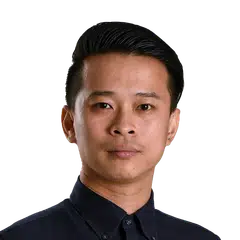From slums to scrums, George Ooro wants to lead Kenya Sevens to more milestones
Sign up now: Get ST's newsletters delivered to your inbox
Follow topic:
SINGAPORE – Kenya Sevens co-captain George Ooro was just 14 when he would sell sardines, work as a cement loader and collect garbage to supplement his fishermen parents’ income on Rusinga Island.
He enjoyed going to school because it meant he would get three meals a day – a luxury in the Third-World country – and gave up football for rugby when he was 16, after realising rugby players were fed better at Chianda High School.
Ahead of the April 5-6 HSBC SVNS Singapore at the National Stadium, the 25-year-old told The Straits Times: “Growing up in the village as the oldest of four siblings was tough. There was a point where accommodation was not good and there was no money for education, so I had to look for work.
“I grew up knowing that one needed to go through a hard life to get a better future.
“When I managed to enter a high school, I joined rugby union because rugby players got more food compared to the rest of the guys.
“As I began playing rugby, I felt this is a sport that needs someone who is a warrior. With all that I went through, I thought this could be the easiest sport for me. Tackling guys, getting into contact, I found it so enjoyable, and people are scared of me.”
Little did he imagine that the sport would also be his way out of poverty and into the Olympics, even if there were a few close calls along the way.
At 18, Ooro would transition from a rugby union back row player into a rugby sevens hooker, as he led Chianda to a historic regional sevens title, leading to a scholarship offer from Strathmore University in Nairobi in 2020. However, coach Louis Kisia told him he was too small and too raw to make the cut.
The Covid-19 pandemic provided him an opportunity to work on his physique as he grew from a “tiny” 1.73m, 82kg teen into a formidable 1.86m, 95kg unit.
When pandemic restrictions eased in 2021, he had to lie to his parents about rejecting Strathmore’s offer to take up a criminology course at the Kenya College of Accountancy, with his mother sending him off to Nairobi with just 800 Kenyan shillings (S$8.30).
To make ends meet, he lived in the Mathare slums and worked at a makeshift gym for pocket money, before a chance meeting with a friend who was studying at Strathmore led to a second trial.
This time, Ooro impressed Kisia with his work rate, power and performance and earned a place in the university to study international relations on a partial scholarship.
With a weekly allowance of 1,000 Kenyan shillings, he moved into a two-bedroom house which he shared with three teammates, but soon found it financially challenging and moved to the Kibera slums and resumed menial work.
“Life was so hard I almost ended up selling drugs for a college mate who was in jail then,” said Ooro, who had to skip breakfast and lunch before Kisia sorted out meals for him.
His career took off spectacularly in 2022 when he was named the Most Valuable Player at the Embu Sevens, a warmup event for the national sevens circuit, as he became the first rookie to win the Sportsman of the Year award at Strathmore, and was drafted into the national team for his World Rugby Sevens Series debut.
Ooro made his debut in the loss to Uruguay in Hong Kong. He accumulated 11 tries throughout the series before he got injured and Kenya were relegated for the first time since 2004.
Though he missed the 2024 Challenger Series, he returned for the promotion and relegation play-offs and helped Kenya secure a return to the top division. In the preceding year, he was also key in Kenya’s qualification for the Paris Games.
Just like how the hard-hitting third-year Strathmore undergraduate has knocked down opponents and obstacles, Ooro wants more breakthroughs.
Even though they have missed out on the top eight and the chance to vie for the HSBC SVNS championship, he is confident Kenya can avoid relegation in the play-off in May. The league winners will be crowned in Singapore, with the New Zealand women and Argentina men leading the regular season standings.
Ooro said: “People still talk about our World Series title in Singapore in 2016, which placed us on the map for team sports because Kenya is known more for athletics. I want to be part of a new history, to help Kenya win another title and qualify for the next Olympics.”
Off the pitch, he has been able to pay for his younger siblings’ education and improve his family’s living conditions, but wants to follow in the footsteps of South Africa’s two-time Rugby World Cup-winning captain Siya Kolisi, who similarly emerged from a disadvantageous background and is now giving back through his own philanthropic work.
Ooro said: “There are many kids from the villages who are like me, who work hard and just need an opportunity to do well in education or sport.
“I used to play for food, but now I also play for them, and I hope that through my performances and interviews, there will be companies or well-wishers who want to partner me to create a foundation for those in need.”
David Lee is senior sports correspondent at The Straits Times focusing on aquatics, badminton, basketball, cue sports, football and table tennis.


